People Management: Issues Facing Managers & HR Performance Analysis
VerifiedAdded on 2023/06/15
|9
|2724
|50
Report
AI Summary
This report provides an overview of people management, focusing on the challenges faced by line managers, the essential skills and behaviors required for effective people management, and the HR processes that underpin performance management. It discusses issues such as employee engagement, tracking team productivity, recruiting talent, managing communication, regulating compliance, and adapting to technological advancements. The report also explores Maslow's hierarchy of needs as a motivational tool and emphasizes the importance of leadership, technical skills, strategic thinking, and decision-making. Furthermore, it examines HR processes like human resource planning, performance management, performance reviews, and HR outcomes, highlighting the role of continuous communication and employee engagement in maximizing potential and boosting productivity. The report concludes by recommending that managers implement these skills and knowledge to overcome challenges and improve overall people management within the organization. Desklib provides solved assignments for students.
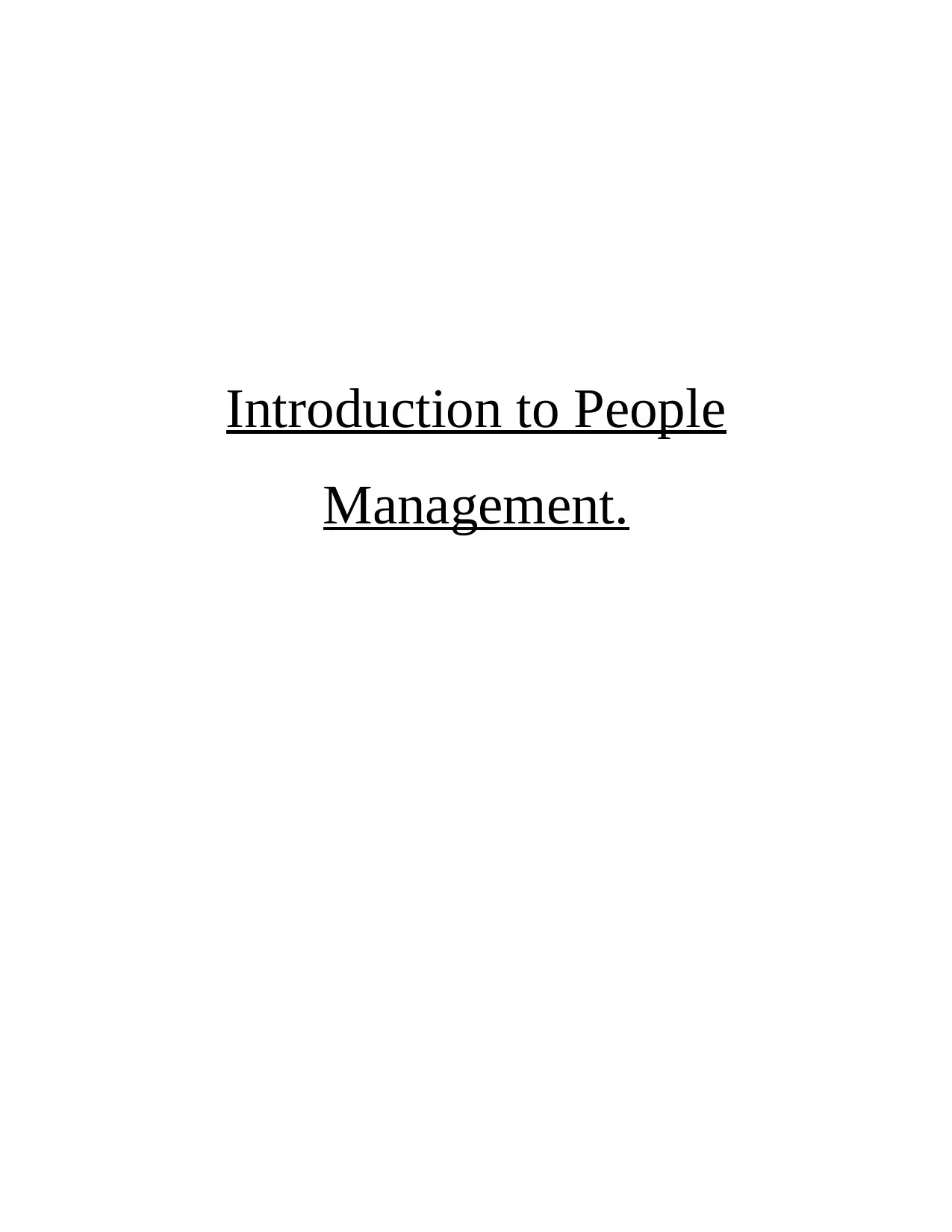
Introduction to People
Management.
Management.
Paraphrase This Document
Need a fresh take? Get an instant paraphrase of this document with our AI Paraphraser
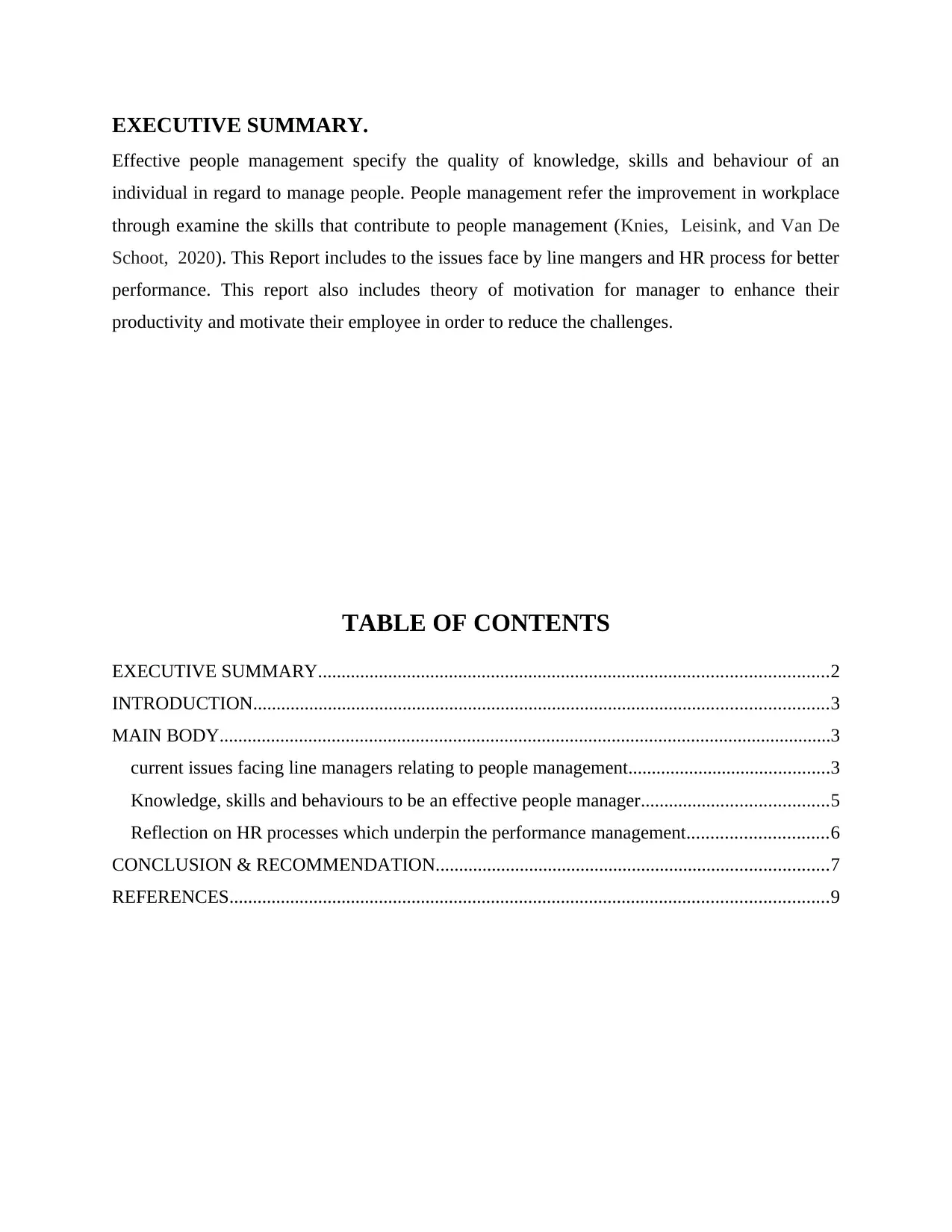
EXECUTIVE SUMMARY.
Effective people management specify the quality of knowledge, skills and behaviour of an
individual in regard to manage people. People management refer the improvement in workplace
through examine the skills that contribute to people management (Knies, Leisink, and Van De
Schoot, 2020). This Report includes to the issues face by line mangers and HR process for better
performance. This report also includes theory of motivation for manager to enhance their
productivity and motivate their employee in order to reduce the challenges.
TABLE OF CONTENTS
EXECUTIVE SUMMARY.............................................................................................................2
INTRODUCTION...........................................................................................................................3
MAIN BODY...................................................................................................................................3
current issues facing line managers relating to people management...........................................3
Knowledge, skills and behaviours to be an effective people manager........................................5
Reflection on HR processes which underpin the performance management..............................6
CONCLUSION & RECOMMENDATION....................................................................................7
REFERENCES................................................................................................................................9
Effective people management specify the quality of knowledge, skills and behaviour of an
individual in regard to manage people. People management refer the improvement in workplace
through examine the skills that contribute to people management (Knies, Leisink, and Van De
Schoot, 2020). This Report includes to the issues face by line mangers and HR process for better
performance. This report also includes theory of motivation for manager to enhance their
productivity and motivate their employee in order to reduce the challenges.
TABLE OF CONTENTS
EXECUTIVE SUMMARY.............................................................................................................2
INTRODUCTION...........................................................................................................................3
MAIN BODY...................................................................................................................................3
current issues facing line managers relating to people management...........................................3
Knowledge, skills and behaviours to be an effective people manager........................................5
Reflection on HR processes which underpin the performance management..............................6
CONCLUSION & RECOMMENDATION....................................................................................7
REFERENCES................................................................................................................................9
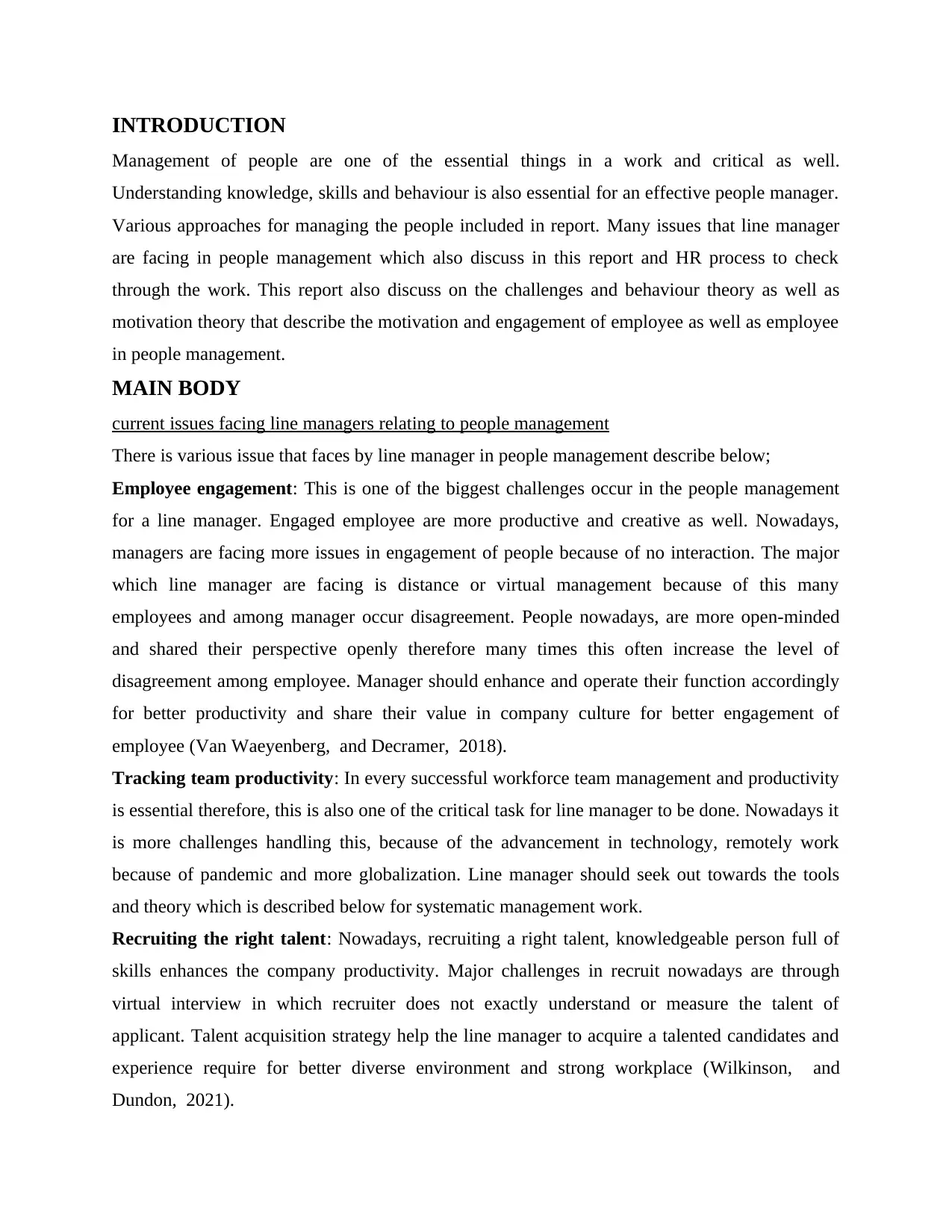
INTRODUCTION
Management of people are one of the essential things in a work and critical as well.
Understanding knowledge, skills and behaviour is also essential for an effective people manager.
Various approaches for managing the people included in report. Many issues that line manager
are facing in people management which also discuss in this report and HR process to check
through the work. This report also discuss on the challenges and behaviour theory as well as
motivation theory that describe the motivation and engagement of employee as well as employee
in people management.
MAIN BODY
current issues facing line managers relating to people management
There is various issue that faces by line manager in people management describe below;
Employee engagement: This is one of the biggest challenges occur in the people management
for a line manager. Engaged employee are more productive and creative as well. Nowadays,
managers are facing more issues in engagement of people because of no interaction. The major
which line manager are facing is distance or virtual management because of this many
employees and among manager occur disagreement. People nowadays, are more open-minded
and shared their perspective openly therefore many times this often increase the level of
disagreement among employee. Manager should enhance and operate their function accordingly
for better productivity and share their value in company culture for better engagement of
employee (Van Waeyenberg, and Decramer, 2018).
Tracking team productivity: In every successful workforce team management and productivity
is essential therefore, this is also one of the critical task for line manager to be done. Nowadays it
is more challenges handling this, because of the advancement in technology, remotely work
because of pandemic and more globalization. Line manager should seek out towards the tools
and theory which is described below for systematic management work.
Recruiting the right talent: Nowadays, recruiting a right talent, knowledgeable person full of
skills enhances the company productivity. Major challenges in recruit nowadays are through
virtual interview in which recruiter does not exactly understand or measure the talent of
applicant. Talent acquisition strategy help the line manager to acquire a talented candidates and
experience require for better diverse environment and strong workplace (Wilkinson, and
Dundon, 2021).
Management of people are one of the essential things in a work and critical as well.
Understanding knowledge, skills and behaviour is also essential for an effective people manager.
Various approaches for managing the people included in report. Many issues that line manager
are facing in people management which also discuss in this report and HR process to check
through the work. This report also discuss on the challenges and behaviour theory as well as
motivation theory that describe the motivation and engagement of employee as well as employee
in people management.
MAIN BODY
current issues facing line managers relating to people management
There is various issue that faces by line manager in people management describe below;
Employee engagement: This is one of the biggest challenges occur in the people management
for a line manager. Engaged employee are more productive and creative as well. Nowadays,
managers are facing more issues in engagement of people because of no interaction. The major
which line manager are facing is distance or virtual management because of this many
employees and among manager occur disagreement. People nowadays, are more open-minded
and shared their perspective openly therefore many times this often increase the level of
disagreement among employee. Manager should enhance and operate their function accordingly
for better productivity and share their value in company culture for better engagement of
employee (Van Waeyenberg, and Decramer, 2018).
Tracking team productivity: In every successful workforce team management and productivity
is essential therefore, this is also one of the critical task for line manager to be done. Nowadays it
is more challenges handling this, because of the advancement in technology, remotely work
because of pandemic and more globalization. Line manager should seek out towards the tools
and theory which is described below for systematic management work.
Recruiting the right talent: Nowadays, recruiting a right talent, knowledgeable person full of
skills enhances the company productivity. Major challenges in recruit nowadays are through
virtual interview in which recruiter does not exactly understand or measure the talent of
applicant. Talent acquisition strategy help the line manager to acquire a talented candidates and
experience require for better diverse environment and strong workplace (Wilkinson, and
Dundon, 2021).
⊘ This is a preview!⊘
Do you want full access?
Subscribe today to unlock all pages.

Trusted by 1+ million students worldwide
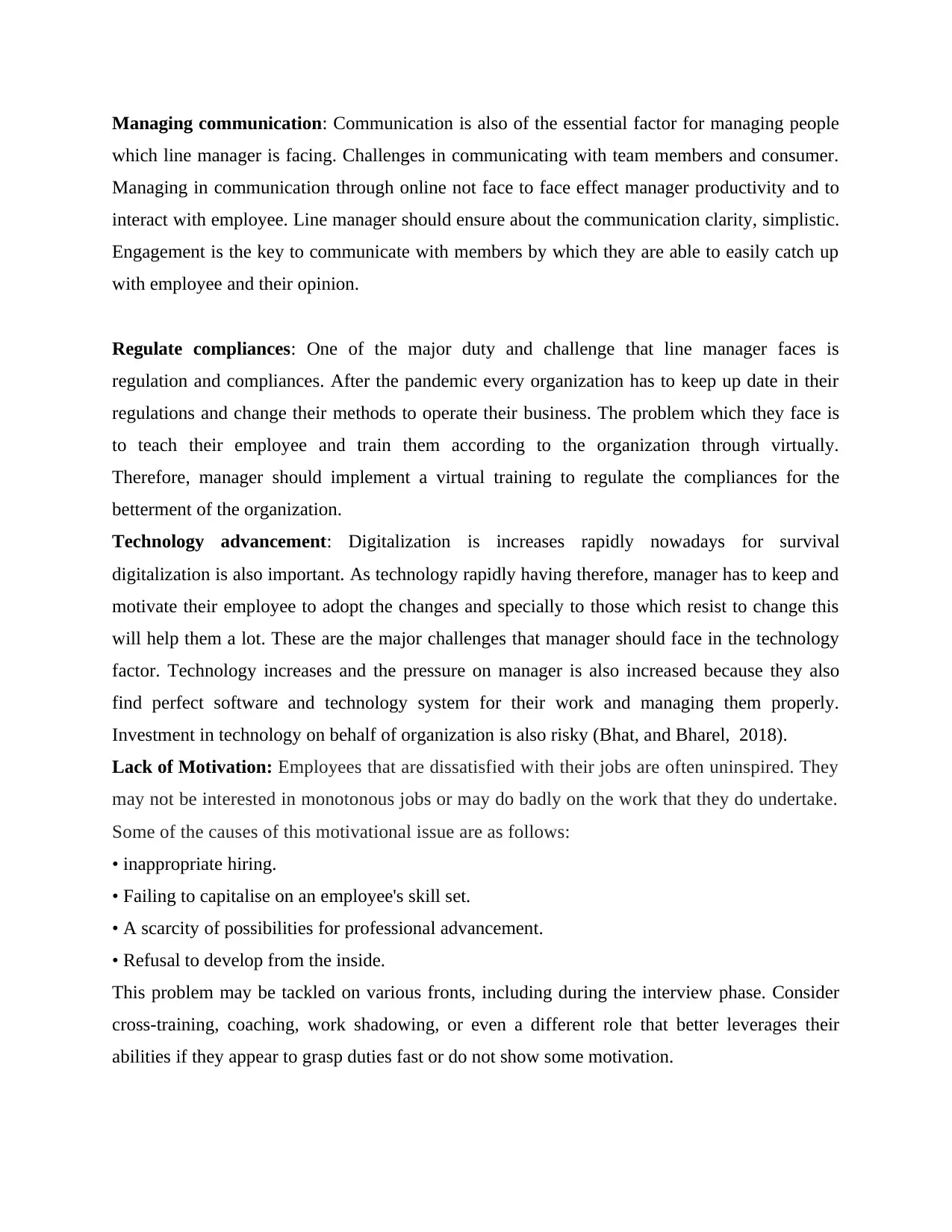
Managing communication: Communication is also of the essential factor for managing people
which line manager is facing. Challenges in communicating with team members and consumer.
Managing in communication through online not face to face effect manager productivity and to
interact with employee. Line manager should ensure about the communication clarity, simplistic.
Engagement is the key to communicate with members by which they are able to easily catch up
with employee and their opinion.
Regulate compliances: One of the major duty and challenge that line manager faces is
regulation and compliances. After the pandemic every organization has to keep up date in their
regulations and change their methods to operate their business. The problem which they face is
to teach their employee and train them according to the organization through virtually.
Therefore, manager should implement a virtual training to regulate the compliances for the
betterment of the organization.
Technology advancement: Digitalization is increases rapidly nowadays for survival
digitalization is also important. As technology rapidly having therefore, manager has to keep and
motivate their employee to adopt the changes and specially to those which resist to change this
will help them a lot. These are the major challenges that manager should face in the technology
factor. Technology increases and the pressure on manager is also increased because they also
find perfect software and technology system for their work and managing them properly.
Investment in technology on behalf of organization is also risky (Bhat, and Bharel, 2018).
Lack of Motivation: Employees that are dissatisfied with their jobs are often uninspired. They
may not be interested in monotonous jobs or may do badly on the work that they do undertake.
Some of the causes of this motivational issue are as follows:
• inappropriate hiring.
• Failing to capitalise on an employee's skill set.
• A scarcity of possibilities for professional advancement.
• Refusal to develop from the inside.
This problem may be tackled on various fronts, including during the interview phase. Consider
cross-training, coaching, work shadowing, or even a different role that better leverages their
abilities if they appear to grasp duties fast or do not show some motivation.
which line manager is facing. Challenges in communicating with team members and consumer.
Managing in communication through online not face to face effect manager productivity and to
interact with employee. Line manager should ensure about the communication clarity, simplistic.
Engagement is the key to communicate with members by which they are able to easily catch up
with employee and their opinion.
Regulate compliances: One of the major duty and challenge that line manager faces is
regulation and compliances. After the pandemic every organization has to keep up date in their
regulations and change their methods to operate their business. The problem which they face is
to teach their employee and train them according to the organization through virtually.
Therefore, manager should implement a virtual training to regulate the compliances for the
betterment of the organization.
Technology advancement: Digitalization is increases rapidly nowadays for survival
digitalization is also important. As technology rapidly having therefore, manager has to keep and
motivate their employee to adopt the changes and specially to those which resist to change this
will help them a lot. These are the major challenges that manager should face in the technology
factor. Technology increases and the pressure on manager is also increased because they also
find perfect software and technology system for their work and managing them properly.
Investment in technology on behalf of organization is also risky (Bhat, and Bharel, 2018).
Lack of Motivation: Employees that are dissatisfied with their jobs are often uninspired. They
may not be interested in monotonous jobs or may do badly on the work that they do undertake.
Some of the causes of this motivational issue are as follows:
• inappropriate hiring.
• Failing to capitalise on an employee's skill set.
• A scarcity of possibilities for professional advancement.
• Refusal to develop from the inside.
This problem may be tackled on various fronts, including during the interview phase. Consider
cross-training, coaching, work shadowing, or even a different role that better leverages their
abilities if they appear to grasp duties fast or do not show some motivation.
Paraphrase This Document
Need a fresh take? Get an instant paraphrase of this document with our AI Paraphraser
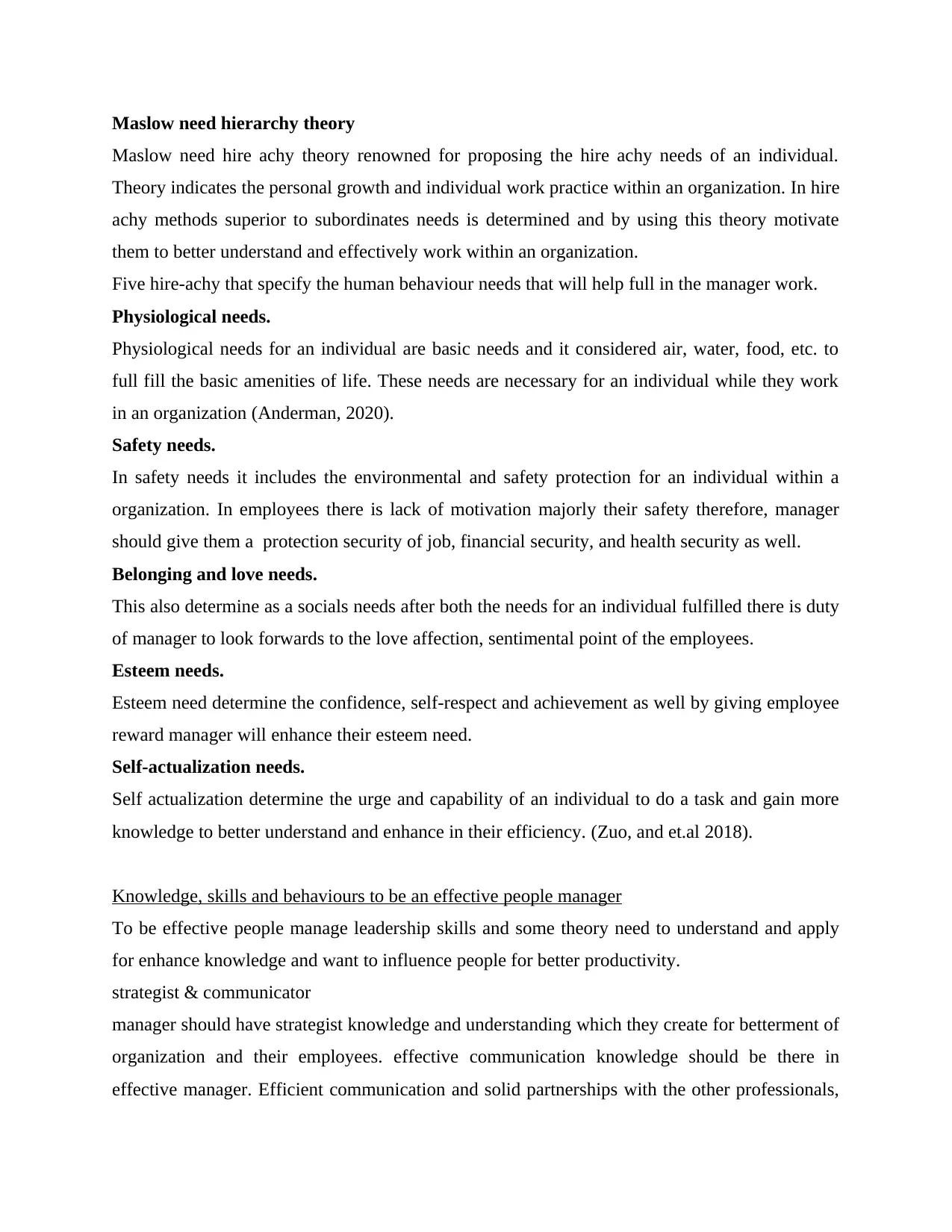
Maslow need hierarchy theory
Maslow need hire achy theory renowned for proposing the hire achy needs of an individual.
Theory indicates the personal growth and individual work practice within an organization. In hire
achy methods superior to subordinates needs is determined and by using this theory motivate
them to better understand and effectively work within an organization.
Five hire-achy that specify the human behaviour needs that will help full in the manager work.
Physiological needs.
Physiological needs for an individual are basic needs and it considered air, water, food, etc. to
full fill the basic amenities of life. These needs are necessary for an individual while they work
in an organization (Anderman, 2020).
Safety needs.
In safety needs it includes the environmental and safety protection for an individual within a
organization. In employees there is lack of motivation majorly their safety therefore, manager
should give them a protection security of job, financial security, and health security as well.
Belonging and love needs.
This also determine as a socials needs after both the needs for an individual fulfilled there is duty
of manager to look forwards to the love affection, sentimental point of the employees.
Esteem needs.
Esteem need determine the confidence, self-respect and achievement as well by giving employee
reward manager will enhance their esteem need.
Self-actualization needs.
Self actualization determine the urge and capability of an individual to do a task and gain more
knowledge to better understand and enhance in their efficiency. (Zuo, and et.al 2018).
Knowledge, skills and behaviours to be an effective people manager
To be effective people manage leadership skills and some theory need to understand and apply
for enhance knowledge and want to influence people for better productivity.
strategist & communicator
manager should have strategist knowledge and understanding which they create for betterment of
organization and their employees. effective communication knowledge should be there in
effective manager. Efficient communication and solid partnerships with the other professionals,
Maslow need hire achy theory renowned for proposing the hire achy needs of an individual.
Theory indicates the personal growth and individual work practice within an organization. In hire
achy methods superior to subordinates needs is determined and by using this theory motivate
them to better understand and effectively work within an organization.
Five hire-achy that specify the human behaviour needs that will help full in the manager work.
Physiological needs.
Physiological needs for an individual are basic needs and it considered air, water, food, etc. to
full fill the basic amenities of life. These needs are necessary for an individual while they work
in an organization (Anderman, 2020).
Safety needs.
In safety needs it includes the environmental and safety protection for an individual within a
organization. In employees there is lack of motivation majorly their safety therefore, manager
should give them a protection security of job, financial security, and health security as well.
Belonging and love needs.
This also determine as a socials needs after both the needs for an individual fulfilled there is duty
of manager to look forwards to the love affection, sentimental point of the employees.
Esteem needs.
Esteem need determine the confidence, self-respect and achievement as well by giving employee
reward manager will enhance their esteem need.
Self-actualization needs.
Self actualization determine the urge and capability of an individual to do a task and gain more
knowledge to better understand and enhance in their efficiency. (Zuo, and et.al 2018).
Knowledge, skills and behaviours to be an effective people manager
To be effective people manage leadership skills and some theory need to understand and apply
for enhance knowledge and want to influence people for better productivity.
strategist & communicator
manager should have strategist knowledge and understanding which they create for betterment of
organization and their employees. effective communication knowledge should be there in
effective manager. Efficient communication and solid partnerships with the other professionals,
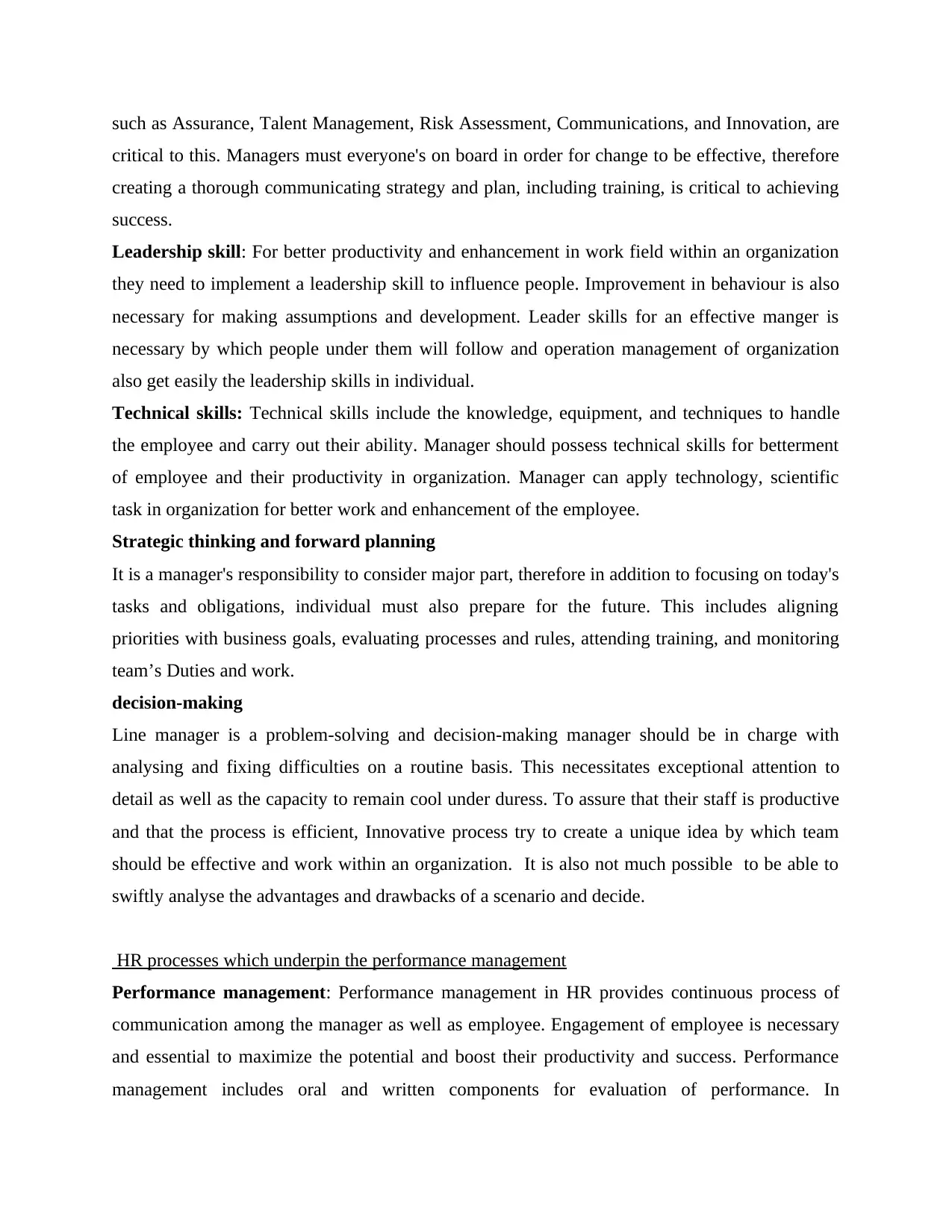
such as Assurance, Talent Management, Risk Assessment, Communications, and Innovation, are
critical to this. Managers must everyone's on board in order for change to be effective, therefore
creating a thorough communicating strategy and plan, including training, is critical to achieving
success.
Leadership skill: For better productivity and enhancement in work field within an organization
they need to implement a leadership skill to influence people. Improvement in behaviour is also
necessary for making assumptions and development. Leader skills for an effective manger is
necessary by which people under them will follow and operation management of organization
also get easily the leadership skills in individual.
Technical skills: Technical skills include the knowledge, equipment, and techniques to handle
the employee and carry out their ability. Manager should possess technical skills for betterment
of employee and their productivity in organization. Manager can apply technology, scientific
task in organization for better work and enhancement of the employee.
Strategic thinking and forward planning
It is a manager's responsibility to consider major part, therefore in addition to focusing on today's
tasks and obligations, individual must also prepare for the future. This includes aligning
priorities with business goals, evaluating processes and rules, attending training, and monitoring
team’s Duties and work.
decision-making
Line manager is a problem-solving and decision-making manager should be in charge with
analysing and fixing difficulties on a routine basis. This necessitates exceptional attention to
detail as well as the capacity to remain cool under duress. To assure that their staff is productive
and that the process is efficient, Innovative process try to create a unique idea by which team
should be effective and work within an organization. It is also not much possible to be able to
swiftly analyse the advantages and drawbacks of a scenario and decide.
HR processes which underpin the performance management
Performance management: Performance management in HR provides continuous process of
communication among the manager as well as employee. Engagement of employee is necessary
and essential to maximize the potential and boost their productivity and success. Performance
management includes oral and written components for evaluation of performance. In
critical to this. Managers must everyone's on board in order for change to be effective, therefore
creating a thorough communicating strategy and plan, including training, is critical to achieving
success.
Leadership skill: For better productivity and enhancement in work field within an organization
they need to implement a leadership skill to influence people. Improvement in behaviour is also
necessary for making assumptions and development. Leader skills for an effective manger is
necessary by which people under them will follow and operation management of organization
also get easily the leadership skills in individual.
Technical skills: Technical skills include the knowledge, equipment, and techniques to handle
the employee and carry out their ability. Manager should possess technical skills for betterment
of employee and their productivity in organization. Manager can apply technology, scientific
task in organization for better work and enhancement of the employee.
Strategic thinking and forward planning
It is a manager's responsibility to consider major part, therefore in addition to focusing on today's
tasks and obligations, individual must also prepare for the future. This includes aligning
priorities with business goals, evaluating processes and rules, attending training, and monitoring
team’s Duties and work.
decision-making
Line manager is a problem-solving and decision-making manager should be in charge with
analysing and fixing difficulties on a routine basis. This necessitates exceptional attention to
detail as well as the capacity to remain cool under duress. To assure that their staff is productive
and that the process is efficient, Innovative process try to create a unique idea by which team
should be effective and work within an organization. It is also not much possible to be able to
swiftly analyse the advantages and drawbacks of a scenario and decide.
HR processes which underpin the performance management
Performance management: Performance management in HR provides continuous process of
communication among the manager as well as employee. Engagement of employee is necessary
and essential to maximize the potential and boost their productivity and success. Performance
management includes oral and written components for evaluation of performance. In
⊘ This is a preview!⊘
Do you want full access?
Subscribe today to unlock all pages.

Trusted by 1+ million students worldwide
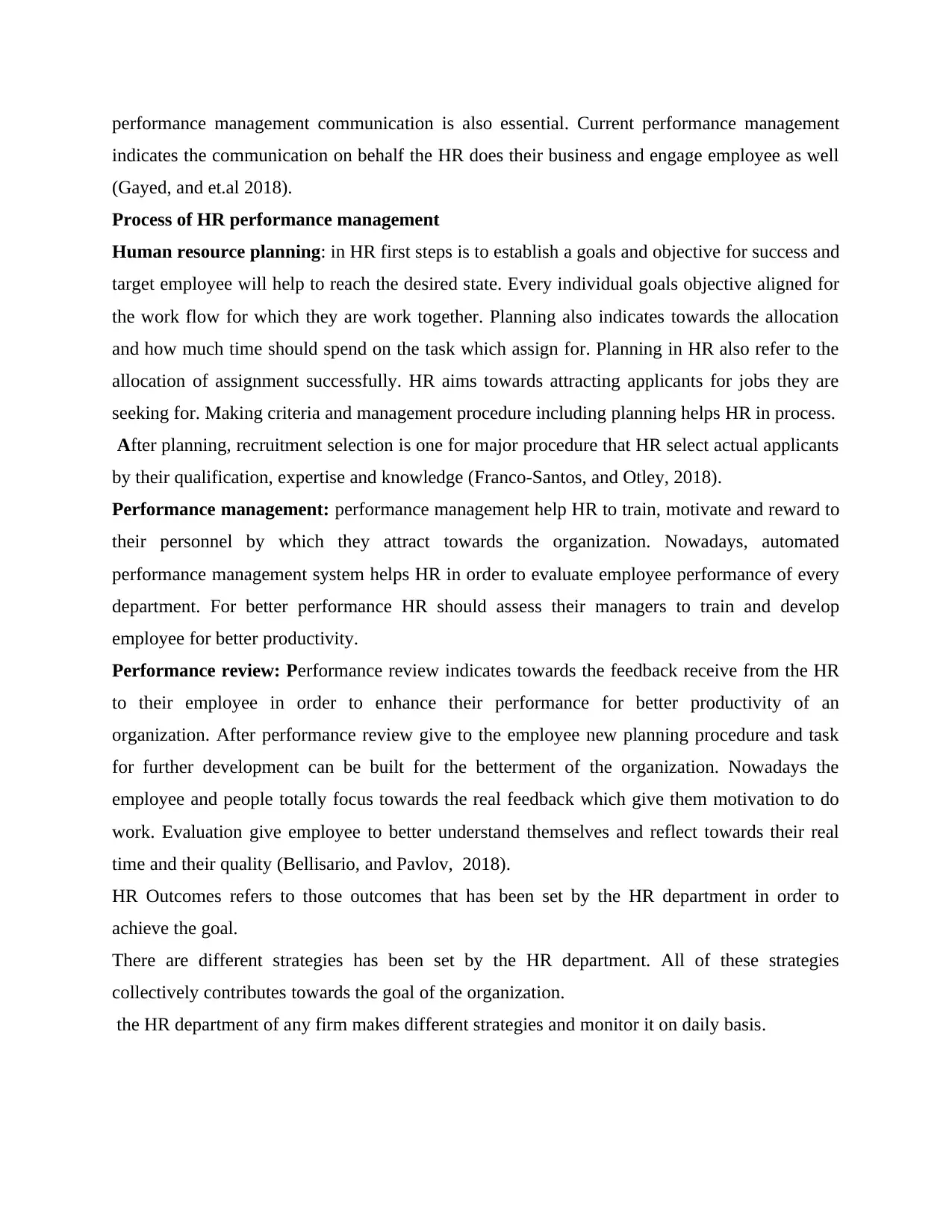
performance management communication is also essential. Current performance management
indicates the communication on behalf the HR does their business and engage employee as well
(Gayed, and et.al 2018).
Process of HR performance management
Human resource planning: in HR first steps is to establish a goals and objective for success and
target employee will help to reach the desired state. Every individual goals objective aligned for
the work flow for which they are work together. Planning also indicates towards the allocation
and how much time should spend on the task which assign for. Planning in HR also refer to the
allocation of assignment successfully. HR aims towards attracting applicants for jobs they are
seeking for. Making criteria and management procedure including planning helps HR in process.
After planning, recruitment selection is one for major procedure that HR select actual applicants
by their qualification, expertise and knowledge (Franco‐Santos, and Otley, 2018).
Performance management: performance management help HR to train, motivate and reward to
their personnel by which they attract towards the organization. Nowadays, automated
performance management system helps HR in order to evaluate employee performance of every
department. For better performance HR should assess their managers to train and develop
employee for better productivity.
Performance review: Performance review indicates towards the feedback receive from the HR
to their employee in order to enhance their performance for better productivity of an
organization. After performance review give to the employee new planning procedure and task
for further development can be built for the betterment of the organization. Nowadays the
employee and people totally focus towards the real feedback which give them motivation to do
work. Evaluation give employee to better understand themselves and reflect towards their real
time and their quality (Bellisario, and Pavlov, 2018).
HR Outcomes refers to those outcomes that has been set by the HR department in order to
achieve the goal.
There are different strategies has been set by the HR department. All of these strategies
collectively contributes towards the goal of the organization.
the HR department of any firm makes different strategies and monitor it on daily basis.
indicates the communication on behalf the HR does their business and engage employee as well
(Gayed, and et.al 2018).
Process of HR performance management
Human resource planning: in HR first steps is to establish a goals and objective for success and
target employee will help to reach the desired state. Every individual goals objective aligned for
the work flow for which they are work together. Planning also indicates towards the allocation
and how much time should spend on the task which assign for. Planning in HR also refer to the
allocation of assignment successfully. HR aims towards attracting applicants for jobs they are
seeking for. Making criteria and management procedure including planning helps HR in process.
After planning, recruitment selection is one for major procedure that HR select actual applicants
by their qualification, expertise and knowledge (Franco‐Santos, and Otley, 2018).
Performance management: performance management help HR to train, motivate and reward to
their personnel by which they attract towards the organization. Nowadays, automated
performance management system helps HR in order to evaluate employee performance of every
department. For better performance HR should assess their managers to train and develop
employee for better productivity.
Performance review: Performance review indicates towards the feedback receive from the HR
to their employee in order to enhance their performance for better productivity of an
organization. After performance review give to the employee new planning procedure and task
for further development can be built for the betterment of the organization. Nowadays the
employee and people totally focus towards the real feedback which give them motivation to do
work. Evaluation give employee to better understand themselves and reflect towards their real
time and their quality (Bellisario, and Pavlov, 2018).
HR Outcomes refers to those outcomes that has been set by the HR department in order to
achieve the goal.
There are different strategies has been set by the HR department. All of these strategies
collectively contributes towards the goal of the organization.
the HR department of any firm makes different strategies and monitor it on daily basis.
Paraphrase This Document
Need a fresh take? Get an instant paraphrase of this document with our AI Paraphraser
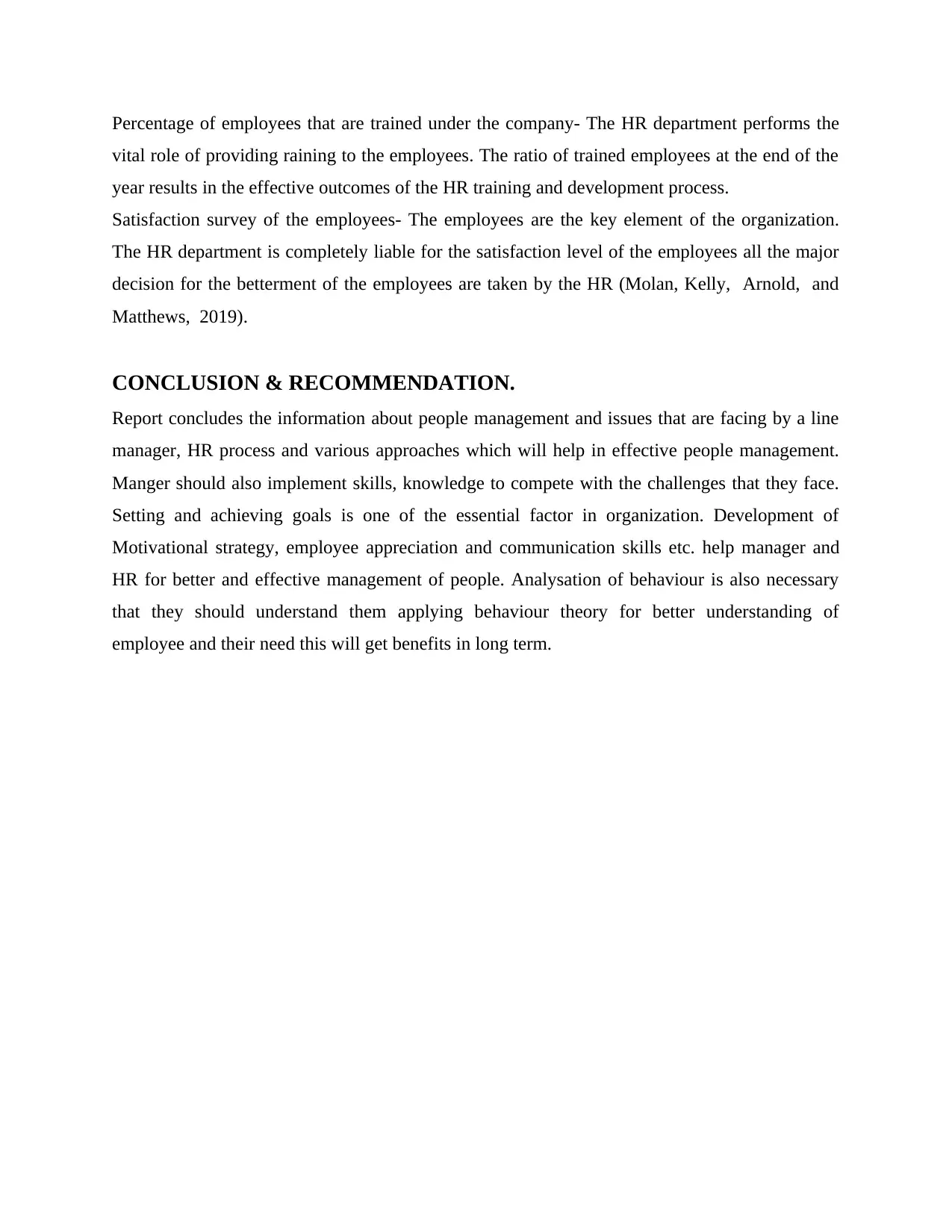
Percentage of employees that are trained under the company- The HR department performs the
vital role of providing raining to the employees. The ratio of trained employees at the end of the
year results in the effective outcomes of the HR training and development process.
Satisfaction survey of the employees- The employees are the key element of the organization.
The HR department is completely liable for the satisfaction level of the employees all the major
decision for the betterment of the employees are taken by the HR (Molan, Kelly, Arnold, and
Matthews, 2019).
CONCLUSION & RECOMMENDATION.
Report concludes the information about people management and issues that are facing by a line
manager, HR process and various approaches which will help in effective people management.
Manger should also implement skills, knowledge to compete with the challenges that they face.
Setting and achieving goals is one of the essential factor in organization. Development of
Motivational strategy, employee appreciation and communication skills etc. help manager and
HR for better and effective management of people. Analysation of behaviour is also necessary
that they should understand them applying behaviour theory for better understanding of
employee and their need this will get benefits in long term.
vital role of providing raining to the employees. The ratio of trained employees at the end of the
year results in the effective outcomes of the HR training and development process.
Satisfaction survey of the employees- The employees are the key element of the organization.
The HR department is completely liable for the satisfaction level of the employees all the major
decision for the betterment of the employees are taken by the HR (Molan, Kelly, Arnold, and
Matthews, 2019).
CONCLUSION & RECOMMENDATION.
Report concludes the information about people management and issues that are facing by a line
manager, HR process and various approaches which will help in effective people management.
Manger should also implement skills, knowledge to compete with the challenges that they face.
Setting and achieving goals is one of the essential factor in organization. Development of
Motivational strategy, employee appreciation and communication skills etc. help manager and
HR for better and effective management of people. Analysation of behaviour is also necessary
that they should understand them applying behaviour theory for better understanding of
employee and their need this will get benefits in long term.
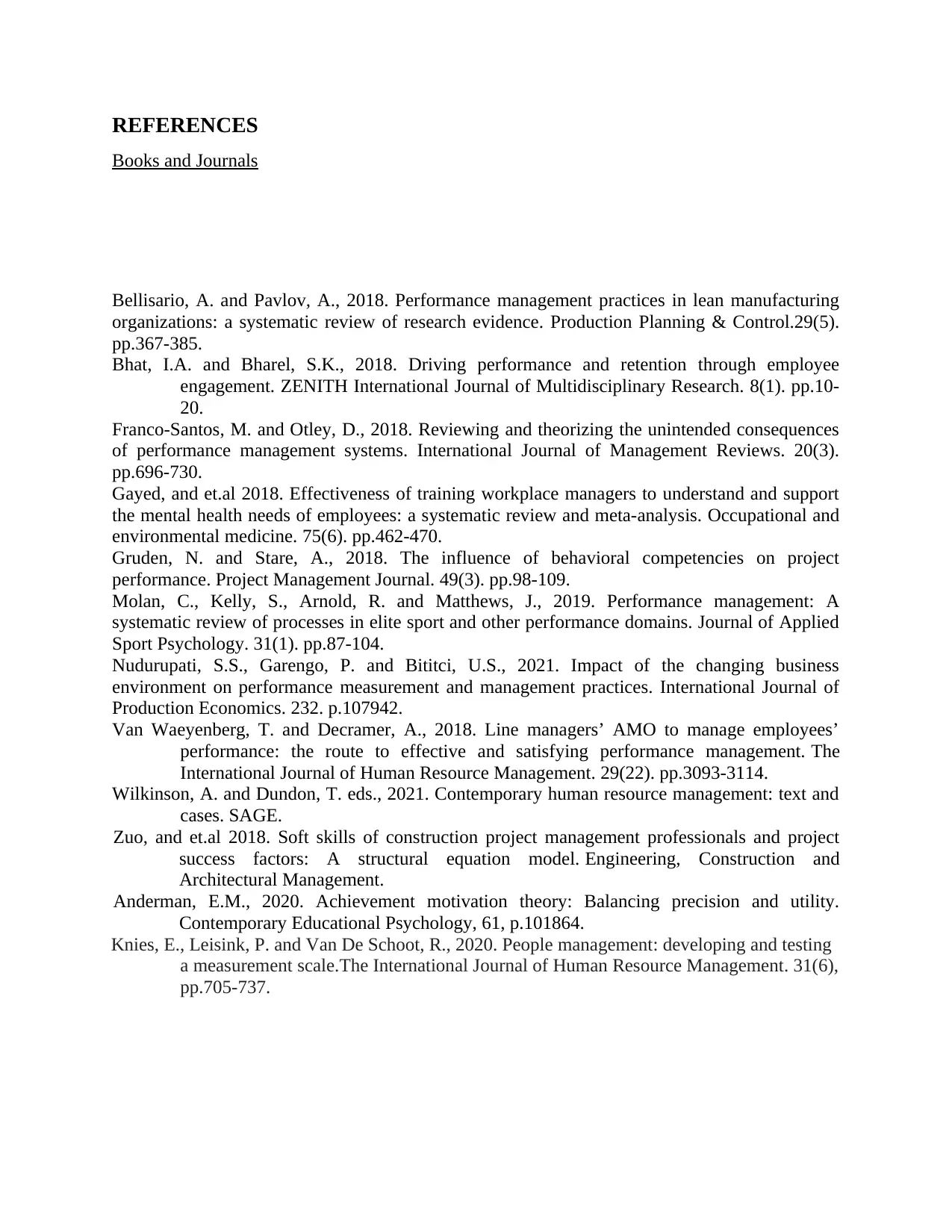
REFERENCES
Books and Journals
Bellisario, A. and Pavlov, A., 2018. Performance management practices in lean manufacturing
organizations: a systematic review of research evidence. Production Planning & Control.29(5).
pp.367-385.
Bhat, I.A. and Bharel, S.K., 2018. Driving performance and retention through employee
engagement. ZENITH International Journal of Multidisciplinary Research. 8(1). pp.10-
20.
Franco‐Santos, M. and Otley, D., 2018. Reviewing and theorizing the unintended consequences
of performance management systems. International Journal of Management Reviews. 20(3).
pp.696-730.
Gayed, and et.al 2018. Effectiveness of training workplace managers to understand and support
the mental health needs of employees: a systematic review and meta-analysis. Occupational and
environmental medicine. 75(6). pp.462-470.
Gruden, N. and Stare, A., 2018. The influence of behavioral competencies on project
performance. Project Management Journal. 49(3). pp.98-109.
Molan, C., Kelly, S., Arnold, R. and Matthews, J., 2019. Performance management: A
systematic review of processes in elite sport and other performance domains. Journal of Applied
Sport Psychology. 31(1). pp.87-104.
Nudurupati, S.S., Garengo, P. and Bititci, U.S., 2021. Impact of the changing business
environment on performance measurement and management practices. International Journal of
Production Economics. 232. p.107942.
Van Waeyenberg, T. and Decramer, A., 2018. Line managers’ AMO to manage employees’
performance: the route to effective and satisfying performance management. The
International Journal of Human Resource Management. 29(22). pp.3093-3114.
Wilkinson, A. and Dundon, T. eds., 2021. Contemporary human resource management: text and
cases. SAGE.
Zuo, and et.al 2018. Soft skills of construction project management professionals and project
success factors: A structural equation model. Engineering, Construction and
Architectural Management.
Anderman, E.M., 2020. Achievement motivation theory: Balancing precision and utility.
Contemporary Educational Psychology, 61, p.101864.
Knies, E., Leisink, P. and Van De Schoot, R., 2020. People management: developing and testing
a measurement scale.The International Journal of Human Resource Management. 31(6),
pp.705-737.
Books and Journals
Bellisario, A. and Pavlov, A., 2018. Performance management practices in lean manufacturing
organizations: a systematic review of research evidence. Production Planning & Control.29(5).
pp.367-385.
Bhat, I.A. and Bharel, S.K., 2018. Driving performance and retention through employee
engagement. ZENITH International Journal of Multidisciplinary Research. 8(1). pp.10-
20.
Franco‐Santos, M. and Otley, D., 2018. Reviewing and theorizing the unintended consequences
of performance management systems. International Journal of Management Reviews. 20(3).
pp.696-730.
Gayed, and et.al 2018. Effectiveness of training workplace managers to understand and support
the mental health needs of employees: a systematic review and meta-analysis. Occupational and
environmental medicine. 75(6). pp.462-470.
Gruden, N. and Stare, A., 2018. The influence of behavioral competencies on project
performance. Project Management Journal. 49(3). pp.98-109.
Molan, C., Kelly, S., Arnold, R. and Matthews, J., 2019. Performance management: A
systematic review of processes in elite sport and other performance domains. Journal of Applied
Sport Psychology. 31(1). pp.87-104.
Nudurupati, S.S., Garengo, P. and Bititci, U.S., 2021. Impact of the changing business
environment on performance measurement and management practices. International Journal of
Production Economics. 232. p.107942.
Van Waeyenberg, T. and Decramer, A., 2018. Line managers’ AMO to manage employees’
performance: the route to effective and satisfying performance management. The
International Journal of Human Resource Management. 29(22). pp.3093-3114.
Wilkinson, A. and Dundon, T. eds., 2021. Contemporary human resource management: text and
cases. SAGE.
Zuo, and et.al 2018. Soft skills of construction project management professionals and project
success factors: A structural equation model. Engineering, Construction and
Architectural Management.
Anderman, E.M., 2020. Achievement motivation theory: Balancing precision and utility.
Contemporary Educational Psychology, 61, p.101864.
Knies, E., Leisink, P. and Van De Schoot, R., 2020. People management: developing and testing
a measurement scale.The International Journal of Human Resource Management. 31(6),
pp.705-737.
⊘ This is a preview!⊘
Do you want full access?
Subscribe today to unlock all pages.

Trusted by 1+ million students worldwide
1 out of 9
Related Documents
Your All-in-One AI-Powered Toolkit for Academic Success.
+13062052269
info@desklib.com
Available 24*7 on WhatsApp / Email
![[object Object]](/_next/static/media/star-bottom.7253800d.svg)
Unlock your academic potential
Copyright © 2020–2026 A2Z Services. All Rights Reserved. Developed and managed by ZUCOL.




